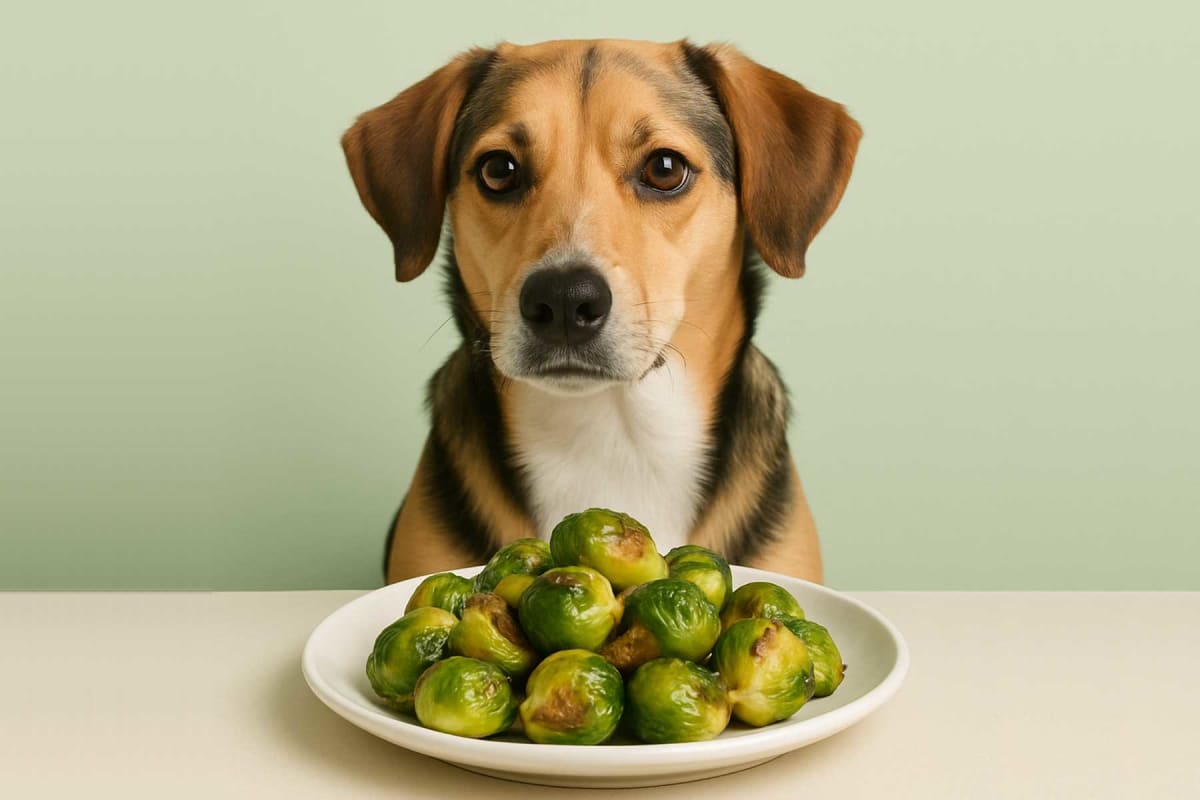
Can dogs eat Brussels sprouts?
Can dogs eat Brussels sprouts?
Can dogs have Brussels sprouts?
Yes, dogs can eat Brussels sprouts in moderation! These little green veggies are generally safe for your four-legged friend and can actually provide some health benefits. However, as with any human food you might share with your pup, there are some important guidelines to follow.
Are Brussels sprouts good for dogs?
Brussels sprouts pack quite a nutritional punch for both humans and canines alike. These miniature cabbage-like veggies are loaded with vitamins and minerals that can benefit your dog's health in several ways.
Rich in several vitamins essential for your pup's health, including A, B1, B6, C, and K
Contain antioxidants that help fight inflammation and may reduce the risk of certain diseases
Source of dietary fiber to aid digestion and promote gut health in your furry friend
Packed with minerals like calcium, manganese, and potassium for healthy cells, bones, muscles, and nervous system function
While your dog gets most essential nutrients from their regular diet, adding small amounts of Brussels sprouts occasionally can provide these bonus health benefits.
Can dogs eat raw Brussels sprouts?
While raw Brussels sprouts aren't toxic to dogs, they're not the ideal way to serve this vegetable to your pet. Raw sprouts are tougher to digest and may cause stomach upset or gas. Cooking Brussels sprouts breaks down fiber and some of the gas-producing compounds, making them easier on your dog's digestive system.
Always avoid adding seasoning, oils, or butter when preparing Brussels sprouts or any veggie treat for your pet.
When are Brussels sprouts bad for dogs?
Despite their health benefits, there are times when these veggies could cause problems for your pet.
Don't feed your dog Brussels sprouts prepared with potentially harmful ingredients like onions, garlic, excessive salt, or oils and spices that are either toxic or could upset your dog's stomach.
If your dog has a history of gastrointestinal problems, consult with your veterinarian before introducing any new foods.
Avoid offering this veggie if your dog has thyroid issues. Brussels sprouts contain goitrogens, which may interfere with thyroid function.
The most common side effect of feeding Brussels sprouts to dogs is gas. This is because Brussels sprouts contain a compound called isothiocyanate, which helps the intestines move waste along but can also produce excess gas. Prepare yourself—even small amounts can cause some (harmless but stinky) gas!
How to safely prepare Brussels sprouts for your dog
Proper preparation is key when sharing Brussels sprouts with your furry friend. Follow these guidelines to ensure a safe and enjoyable experience for your pup:
Wash the Brussels sprouts thoroughly to remove any pesticides or contaminants.
Remove the tough stem end and any damaged outer leaves.
Cut larger sprouts in half or quarters to prevent choking, especially for smaller dogs.
Cook the sprouts until they're tender but not mushy.
Allow them to cool completely before serving them to your dog to prevent burns to their sensitive mouth and tongue.
The best way to cook Brussels sprouts for dogs is by steaming, boiling, or microwaving them without any added ingredients. Do not use oil, butter, salt, spices, or any other seasonings, as these can upset your dog's stomach or even be harmful.
How many Brussels sprouts can I give my dog?
When it comes to Brussels sprouts, moderation is crucial. Too many can lead to digestive upset, even for dogs who tolerate them well. For small breeds, this might mean just a quarter or half of one sprout. Medium-sized dogs might have one full sprout, while larger breeds could potentially have two or three, depending on their size.
Start with an even smaller amount the first time you offer Brussels sprouts to your dog, and watch for any signs of digestive upset. If your dog tolerates this small serving well, you can gradually increase the amount up to the recommended limit.
A good rule of thumb is to limit Brussels sprouts and any other treats to no more than 10% of your dog's daily food intake.

Other safe vegetables for dogs
If your dog enjoys Brussels sprouts, they might also appreciate other vegetables safe for dogs as occasional treats, such as:
Carrots
Celery
Cucumber
Green beans
Plain, cooked sweet potato
Plain, cooked pumpkin
Variety can provide different nutrients and keep mealtime interesting! Remember that any human food, including vegetables, should only make up a small portion of your dog's diet. Their commercial dog food is formulated to provide the balanced nutrition they need, and treats should complement—not replace—their regular meals.
Always introduce new foods gradually and consult with your veterinarian if you have questions about your dog's specific dietary needs or restrictions.